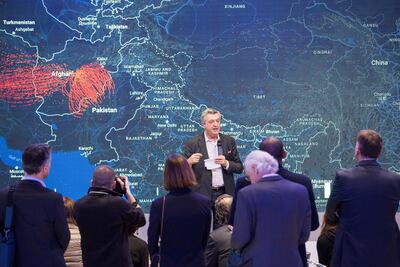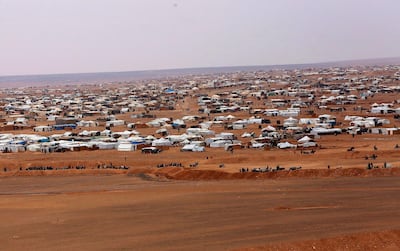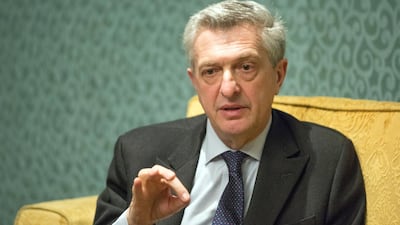There are still significant obstacles in the way of Syrian refugees returning to their homeland and any returns must be voluntary, the United Nations High Commissioner for Refugees Filippo Grandi has warned.
In an exclusive interview with The National on the sidelines of the World Economic Forum Annual Meeting in Davos, Mr Grandi said "it is not a matter of you or me or another government to decide if people should go back, they have to make that decision, of course with immense respect for the countries hosting them, but they have to make that decision".
There are increased concerns that Syrian refugees will be pushed out of Lebanon, Turkey and Jordan as a political solution is being negotiated. Mr Grandi was assured that "so far countries have respected the voluntariness of return". He added that the number of Syrians returning has been relatively small "because there are three big sets of obstacles".
The first of these obstacles is "the remaining conflict". He said the world needed to remember "it is not over". The second is "there is a lot of destruction, people are hesitant to go back to a destroyed country", as reconstruction is not yet starting in most parts of Syria. As for the third obstacle, it is the need for "legal protection, amnesties that need to be put in place, laws that need to be reformed and so forth". He added that UNCHR is "working on all these things in the way we can, including humanitarian support for those who go back and in terms of the legal work".
The case of Rukban camp, where thousands of Syrians are stranded in the desert on the border with Jordan is one of the worst examples of Syrian suffering. Mr Grandi said the situation there was bad "but the problem there is access, at this point the main access is from Syria, but unfortunately is in an area not yet secure enough to deliver aid".
Mr Grandi predicted that the return of Syrian refugees, 6 million of whom are in neighbouring countries, will happen gradually. He added "the numbers are small but we do need to think in those terms and we do need to think about returns".
The return of Syrian refugees is a topic that has been linked to the wider political process in Damascus, however Mr Grandi urged all the actors concerned "do not politicise the refugee issue. You cannot use the refugee issue either to score political points one way or the other". While he would not name which countries were using the refugee issue, he did say "I am speaking to everybody, it is being used". He made reference to the Palestinian refugee plight "as seventy years on, there are still refugees because there is no political solution.. we don’t want the Syrians to end up in the same situation".

While returns are expected gradually and slowly among Syrian refugees, it remains the largest refugee situation in the world and will take time, which means the need for developmental work to support Syrian and other refugees continues. Mr Grandi was speaking from Davos as he was attending the Annual Meeting of the World Economic Forum to urge private sector support to refugees and host countries.
This momentum comes with a renewed energy at the UNHCR after the passing of the Global Compact on Refugees last September.
"The Global refugee compact is the first ever attempt that we have made to re-define the responses to the refugee crisis by enlisting or including the support of many other actors," he said.
"The refugee responses until now have been seen as humanitarian action, which of course it is but it is not only that, because refugees on the move create development needs. The most typical example is education but it includes employment and livelihoods and other needs".
A new senior adviser for private sector partnerships at the UN agency, Jaime de Bourbon de Parme has been appointed to look into private sector partnerships, beyond raising funds.
The average time spent at a refugee camp has reached 26 years, according to Mr Grandi, "because we have become so bad at making peace, conflicts last for a long time and even after conflict it is difficult to create conditions for people to go back". He stressed "return is still the best solution but it may take some years".
"The compact says let us look at these issues from the beginning of the crisis. Who can respond to those needs? Not just international organisations, but financial institutions have an important role to play, not necessarily in a philanthropic way but in bringing investment or know how or technology. They can bring employment. They can help create an environment where investments become possible," he said.
"We are working on all this in Davos, we want to create the momentum around this issue. There are leaders here that are already into it and they are helping us mobilise the others."

There is however the concern that mobilising other actors like the private sector can lead to an abdication of responsibility from government. Mr Grandi is aware of the concern and says "yes we have to be very careful, expanding the responses to broader coalitions does not mean you lose the key responders. The first responders will inevitably continue to be governments. As governments respond and must respond and take responsibility, in reality the actual first response is always by communities".
An example of this is when the Rohingya fled violence in Myanmar and were helped by communities receiving them by their own cars and with whatever water they had. He added that "humanitarian resources are unable to cover this longer term need for the refugees and the host communities". The UN body responsible for refugees estimates that eighty-five per cent of refugees are in poor or middle-income countries, so they need help.
The American decision to vote against the resolution to bring in the global refugee compact led to questions about the commitment of other countries to it. Mr Grandi said that the Americans "explained their vote and said they were not against the compact itself but against the resolution and its wording".
He added: "It is clear that the US has a problem with some of the multilateral approach and some UN approaches. It is a pity as multilateral approaches – especially when you talk about phenomena like refugees, climate, poverty – are needed but so be it, it is a political trend which I hope at some stage will stop or reverse but that is the way it is".
In terms of how the US supports refugees around the world, the response has been very good and continues to be very good, he said.
"How the US treats refugees going to the US, they are restrictive", even though the US only takes a fraction of the world’s refugees.

